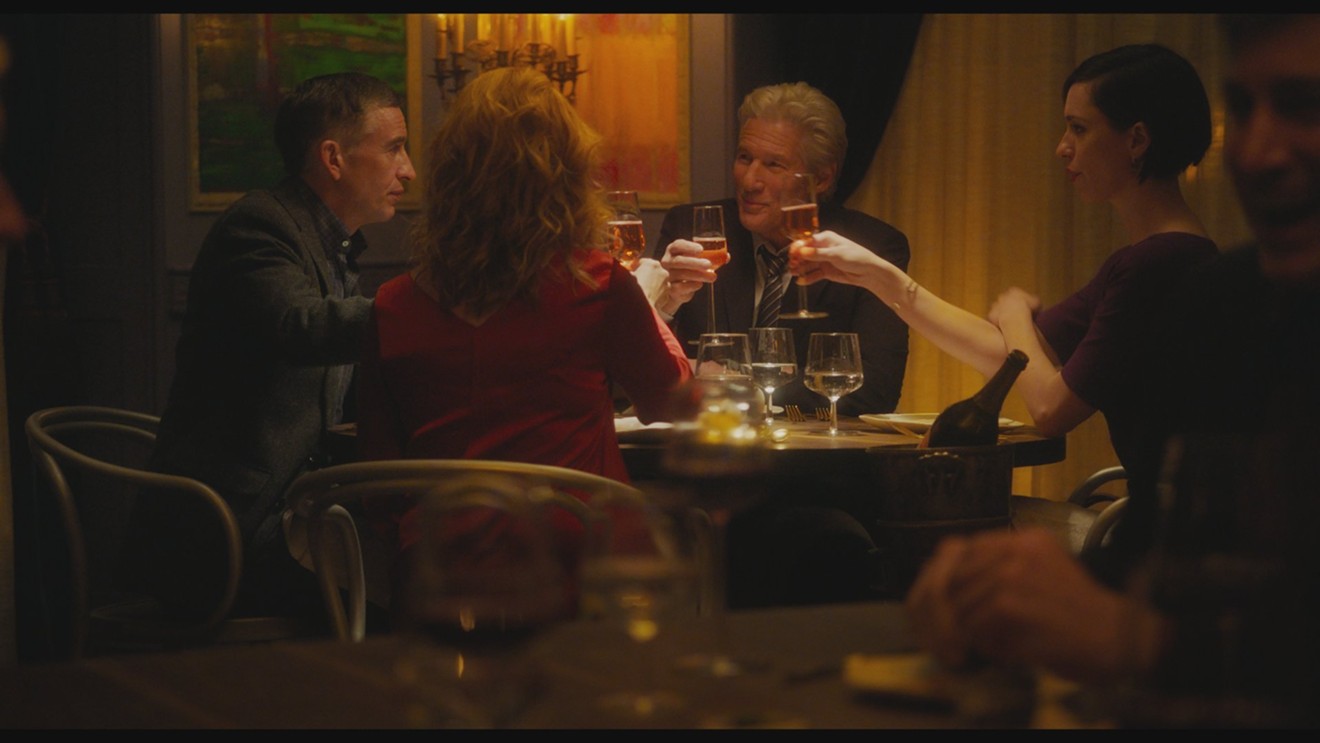Steve Coogan is at a fancy dinner, but he’s not doing any Michael Caine impressions. Instead, he’s brooding with resentment of his workaholic congressman brother, Stan (Richard Gere), and grappling with the realization that his son might be a psychopath. It’s all supposed to be harrowing, and the British comedian certainly might have pulled off the serious role of the unreliable narrator in this dark family drama if it weren’t for director Oren Moverman’s apparent insistence that he stay somewhat in character as “Steve Coogan” from The Trip. This makes his Paul Lohman strained comic relief when he’s not displaying nervous tics or being outright rude at the table — both habits possibly informed by his mental health issues. The result is a disastrous tonal mismatch.
Coogan’s characterization isn’t the only thing jarring about this adaptation of Herman Koch’s novel of the same name, about two couples meeting over dinner to discuss a horrendous episode involving their kids. The dinner itself is constantly disrupted by long-winded flashbacks — often in cheesy soft focus — that seem intended to put together the pieces of the puzzle. Instead, they drift too far from the drama, undercutting it. The beauty of a single-location thriller is how the tension escalates in containment, but Moverman fails to seize that built-in advantage. Instead of dropping hints about what kind of monsters his characters might be, and then working toward a dramatic revelation, he works anticlimactically.
There have been two previous big-screen versions (Dutch and Italian) of Koch’s book, but this is the first American adaptation, and it has the most noteworthy cast: Laura Linney and Rebecca Hall play wives to Coogan and Gere, respectively; Chloë Sevigny makes a brief appearance as Gere’s ex-wife. Third time’s a charm, supposedly, but Moverman doesn’t know what to do with the page-turner source material. Set up with title cards, from apéritif to digestif, The Dinner should accelerate early and then achieve momentum. It starts promisingly, when everyone arrives under the pretense of cordiality. Katelyn (Hall) walks in wearing sunglasses indoors because she had just been crying but, like a good politician’s wife, puts on a smile and says, “I have nothing to complain about.” You can tell things are bound to explode.
Not for a while, though — and not with any power or excitement. No one stays at the table long enough for things to get satisfyingly tense, whether it’s because Stan keeps excusing himself to meet with his assistant, or because those flashbacks take us out of the scene altogether. It’s not until the cheese course — after the entrée — that things start to pick up. In the strongest moment, Moverman rotates his camera to survey his players, as though it’s on a Lazy Susan in the middle of the table. The pan across their faces at last reveals each character’s psychology as they process the “accident” and what they should do about it.
But by this point only dessert and digestif remain, and the big decision at the end feels not only rushed but unresolved. A strong cast and premise wasted, but at least the food looked delicious.
[
{
"name": "Air - MediumRectangle - Inline Content - Mobile Display Size",
"component": "12017618",
"insertPoint": "2",
"requiredCountToDisplay": "2"
},{
"name": "Editor Picks",
"component": "17242653",
"insertPoint": "4",
"requiredCountToDisplay": "1"
},{
"name": "Inline Links",
"component": "18838239",
"insertPoint": "8th",
"startingPoint": 8,
"requiredCountToDisplay": "7",
"maxInsertions": 25
},{
"name": "Air - MediumRectangle - Combo - Inline Content",
"component": "17261320",
"insertPoint": "8th",
"startingPoint": 8,
"requiredCountToDisplay": "7",
"maxInsertions": 25
},{
"name": "Inline Links",
"component": "18838239",
"insertPoint": "8th",
"startingPoint": 12,
"requiredCountToDisplay": "11",
"maxInsertions": 25
},{
"name": "Air - Leaderboard Tower - Combo - Inline Content",
"component": "17261321",
"insertPoint": "8th",
"startingPoint": 12,
"requiredCountToDisplay": "11",
"maxInsertions": 25
}
]











